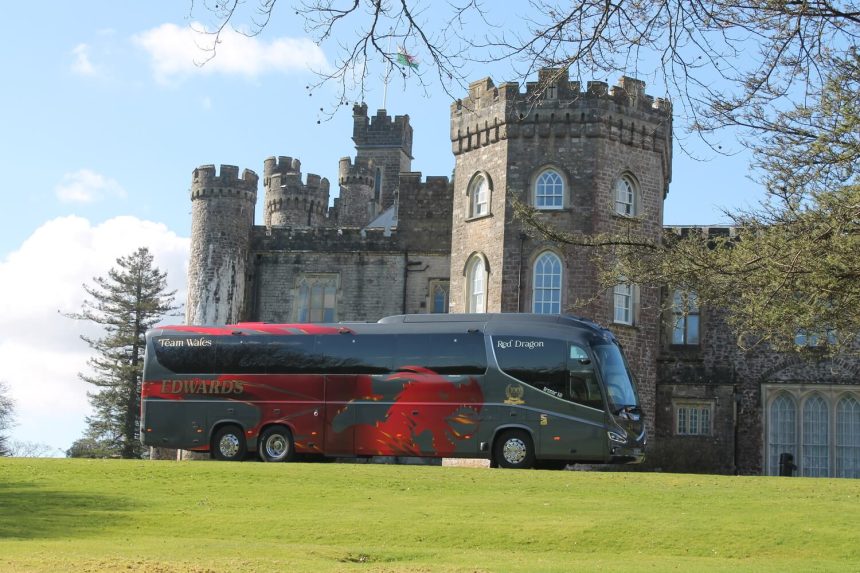Across the road from the Royal Mint, the UK’s oldest company, and in a town much older than the other settlements in its vicinity, is a business blessed with a similarly rich tradition in the sphere of coach and bus. Edwards Coaches in Llantrisant is marking its 100th anniversary this year. However, on the very morning your correspondent arrived at the headquarters, the new as well as the old was being celebrated.
In a landmark moment for the business, it was beginning a trial of its first electric bus. The Volvo BZL shares a depot with a recently purchased 1931 Maudslay ML3BC which the operator is proudly restoring.
While this juxtaposition aptly demonstrates the difference in powertrain technology between when Edwards started and now, a century has seen a great deal of change in the industry in general.
Our customers want quality; they don’t want cheap and cheerful – Mike Edwards
Yet some things are the same. For a start, an Edwards is in charge. Chairman Mike Edwards, the great grandson of founder George, has turned it into one of the biggest family coach businesses in the UK with more than 250 vehicles.
With over 500 employees, the operator’s coaches and buses embarked on 15.5 million miles in 2024 and it spends circa £20,000 per day on fuel.
Much of that fuel is burned on scheduled work for National Express as Edwards is its largest partner operator.
It runs 116 daily services on 22 routes, including the Bristol-London line, which replicates the world’s first scheduled coach service with en-route stops — also dating back to 1925 in the hands of Greyhound.
Size is a significant boost
The tourism arm is big for Edwards too and its 2025 holiday brochure carries more than 700 tours — everything from one-day Harry Potter studio tours to 13 days in Costa Brava.
Indeed, with the latest brochure hot off the press, the January rush saw over £400,000 in holiday sales in just one week. “It’s almost like playing with Monopoly money,” says Mike of the figures involved in running a business of this size.
Being such a massive operation has obvious benefits from a business perspective. Despite those “Monopoly” numbers which help keep Edwards’ neighbours across the road busy, overheads can be minimised.
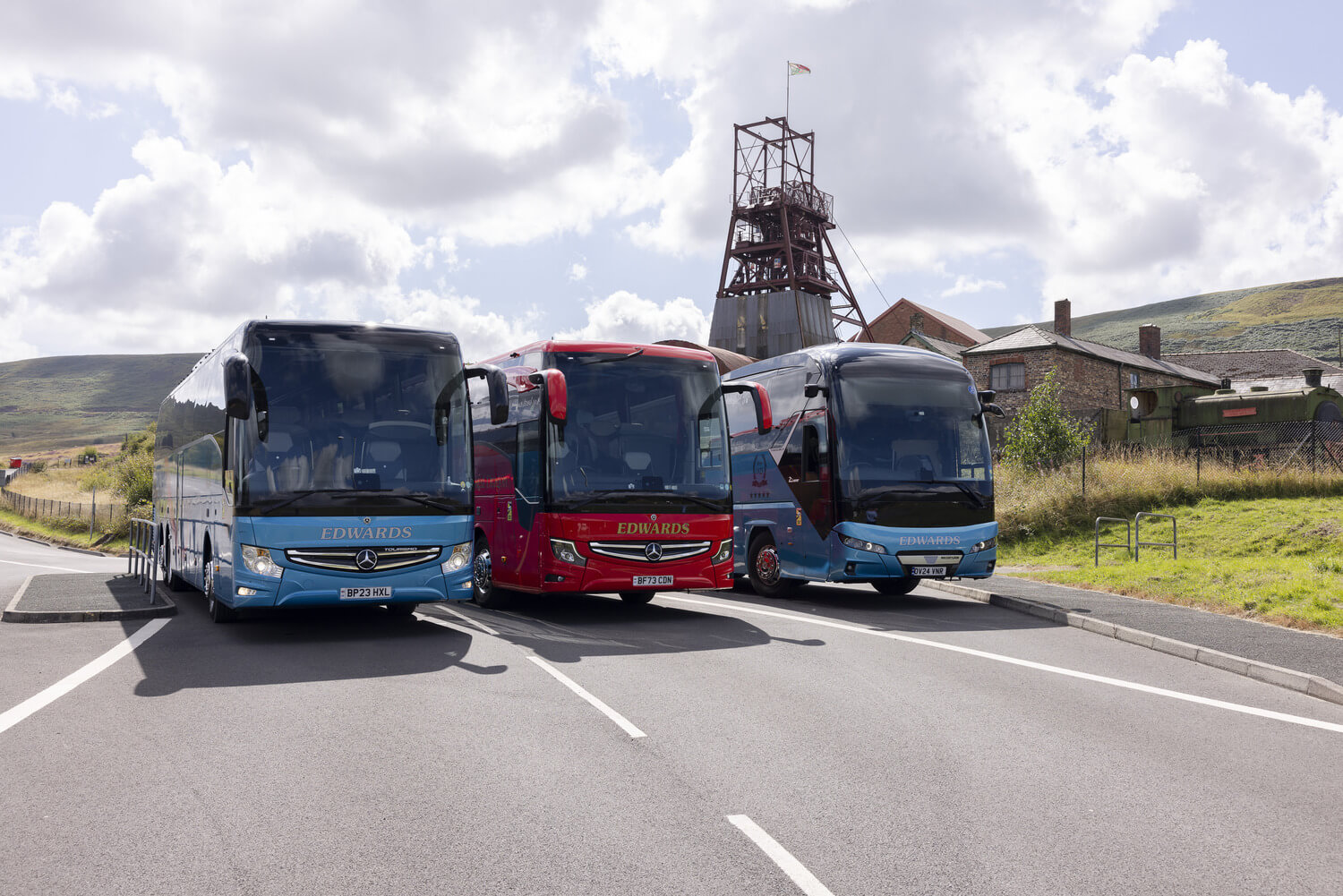
The business can do almost everything itself — including, for example, vehicle painting — and its eight-bay workshop caters for not only for the operator’s needs but advertises its services to external businesses.
Fleet Engineer Pasquale Balzano, who has worked on PSVs for 44 years, explains: “It’s just as easy to run 200-odd vehicles as it is to run 40-50. Exceeding legal standards ensures that our varied fleet is a reliable one, and that’s important, not just from an engineering perspective.”
Mike adds: “I don’t think being this size has any disadvantages. You’ve got economies of scale, which affords us the opportunity to negotiate pricing on bulk purchases such as fuel.”
Edwards Coaches benefiting from scheduled boom
He is happy for the business to grow further, particularly when it comes to National Express work. Edwards, which also has depots in Swansea and Avonmouth and a series of outstations, has benefited from the recent boom in scheduled services.
Head of Operations Richard Thomas says the passenger volumes are the highest he has seen them in nine years at Edwards and 12 years prior to that at National Express.
He says: “The train disruption has pushed a lot of people to try coach for the first time and a lot of those customers have stayed, especially on certain routes like Bristol to London where it’s M4 straight in, so there’s not a huge difference in time between that and the train, but it can be a tenth of the cost, with the security of a guaranteed seat.”
Back to roots with local bus services
Another thing that is the same as the founding days is that Edwards operates local buses. Edwards Bros — as the business was then known — started out by converting trucks into passenger-carrying vehicles and began operations when it gained the contract to run services between Beddau and Pontypridd.
It returned to local bus in 2010, “because Bebb sold out to Veolia and they made a right hash of it,” says Mike, who adds: “The local passengers would let the Veolia bus go and wait for our bus because it was nicer, cleaner and wasn’t going to break down, plus our drivers are friendly and professional.”
Today it operates seven services, again including one that links Beddau and Pontypridd, numbered 100.
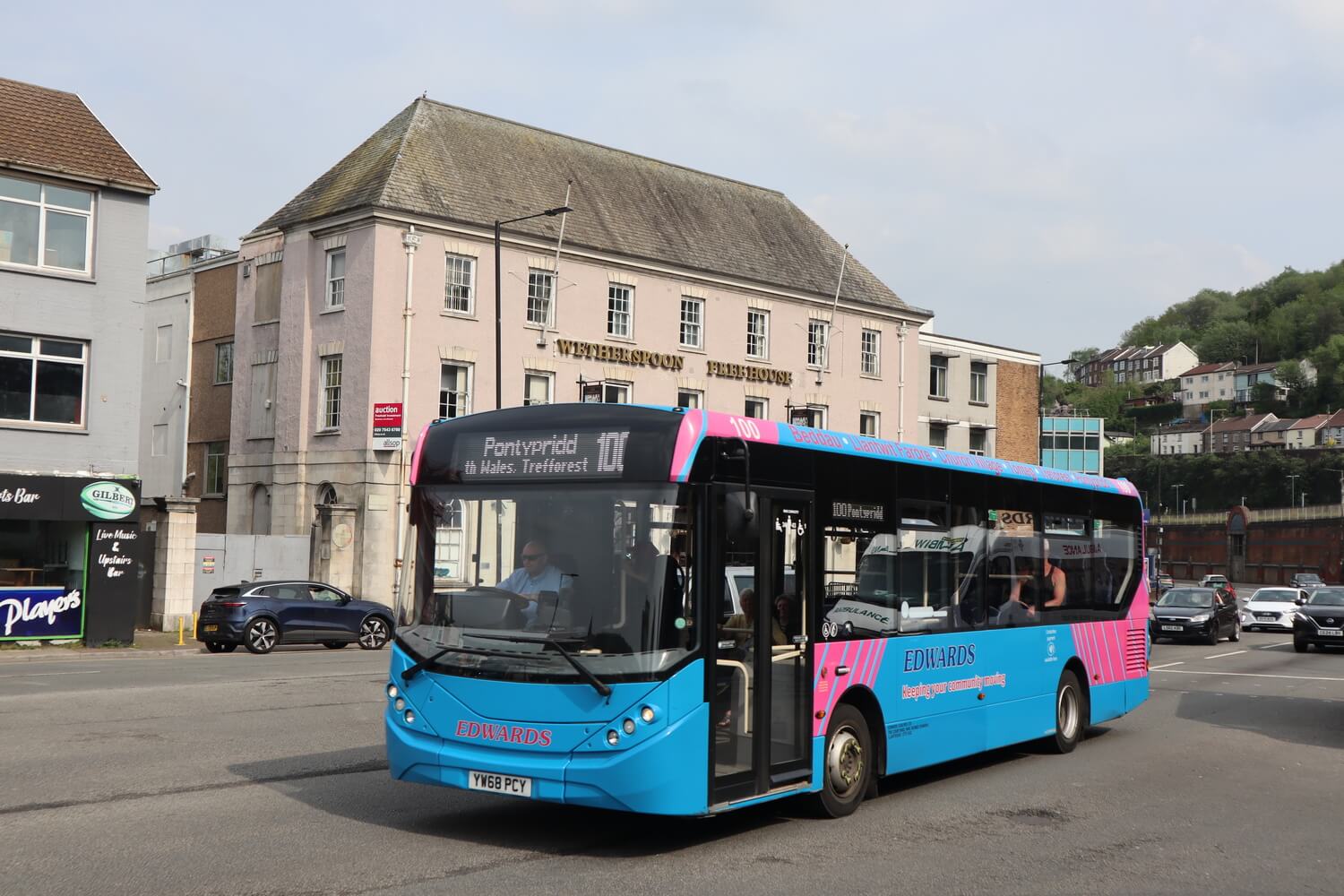
However, as Mike says: “I’ve had discussions with Transport for Wales (TfW) about the pressures that businesses like ours face with local services. Whilst we want to continue to serve our local communities, it’s not hugely profitable.”
Richard adds: “It’s doing okay and we’ve done some things to turn it around but, when you get to the point when you need to buy new vehicles and there’s a lack of funding, that’s when you’ve got to think carefully about the viability of services.
“We are conscious about not just resorting to increasing ticket prices time after time as this will discourage people to travel, we need to be mindful of making services work for everyone.”
Mike is sceptical about the forthcoming reregulation of bus services in Wales. “There are very good operators in Wales. If an operator can’t make much money on a local service, how is TfW going to do it?
“We are optimistic and want to continue our positive working relationship with TfW as the operating landscape in Wales changes.”
Edwards Coaches’ success with tours
Edwards’ holidays arm is what Mike says has been crucial to the success of the business over the years. He comments that attention to detail is vital to retain customers as well as attracting new ones.
“You’ve got to make sure the driver is right because they can make or break it,” says Mike, who here mentions his pet hate of dirty vehicles.
“We must make sure the coach is right. We try to buy the best coaches. Setra was our mainstay, the tri-axle Setra was the best coach ever made. When they stopped making them for UK market, we changed to Mercedes-Benz and our customers and drivers love them. They are an excellent product, and we have just had further examples delivered.”
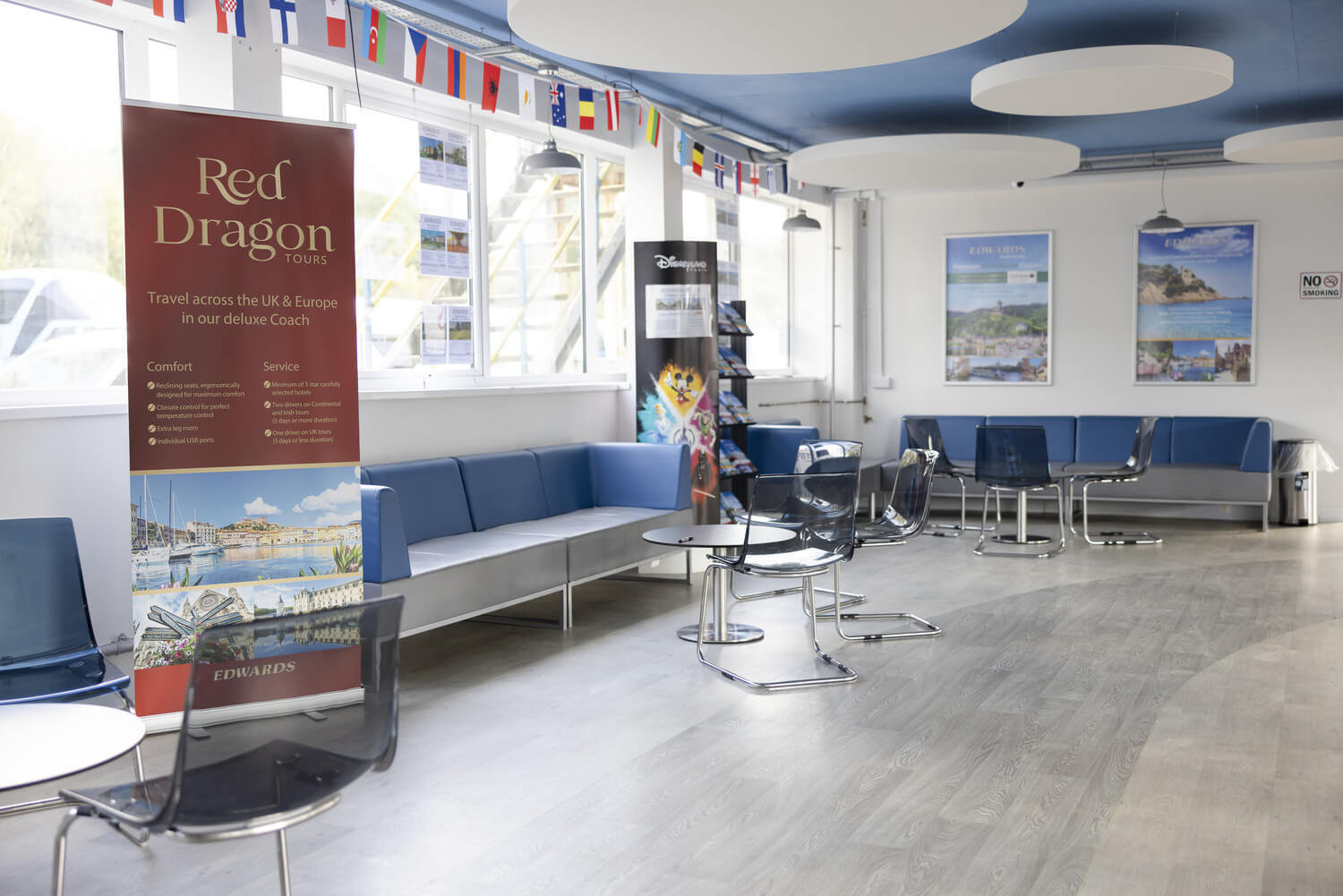
Making sure hotels used are up to scratch is vital too, says Mike, whose business also owns the Portbyhan Hotel in Looe.
Although Edwards offers some low-cost holidays, Mike points out: “Our customers want quality; they don’t want cheap and cheerful.”
Richard adds of its approach to customer service: “It’s the little add-ons. When they’re arriving at the hotel, they’ve normally got a cream tea waiting for them while the check-in’s done.
“The reason why the competitor is maybe £20 cheaper is maybe you’re not getting that part or other extras which enhance the overall holiday experience.”
Challenges in store
As for private hire, Commercial Manager Simon Ingham says rates are “remaining buoyant”. But he adds: “We need to remember that pressures are imminent, like the employer National Insurance contributions rise.
“It’s going to impact every coach company, but we need to be mindful that we still need to be competitive to win the business.”
The government policy set to start in April will cost Edwards an extra £440,000 a year in staff wages, says Mike.
You mustn’t lose track of the fact that we come here every day to make money – Mike Edwards
Another potential obstacle is a change in the criteria for home-to-school funding from local council Rhondda Cynon Taf. Approximately 30 of the area’s school bus routes will be cut at the end of this academic year and all of Edwards’ contracts are up for renewal.
Simon adds: “We are poised ready and waiting for the tender opportunity. The good thing is that Edwards is diverse and has various strings to its bow — holidays, school and local services, private hires, corporate and National Express contracts.
“We continue to look for more opportunities.”
Team spirit
A particular source of pride for Edwards is its contract to carry the Welsh Rugby Union team. The design for the Mercedes-Benz Tourismo assigned to that work won the overall coach category in the 2024 routeone Livery Competition.
A new Scania Irizar i8 arrival last month, kitted out in a smart and slightly revised but equally striking livery, is taking over team duties. Putting national rivalry aside, Edwards was also on hand to offer services to Tony Doyle Coaches, ensuring its coach was ready transport the Ireland team to take on Wales in the Six Nations match last month.
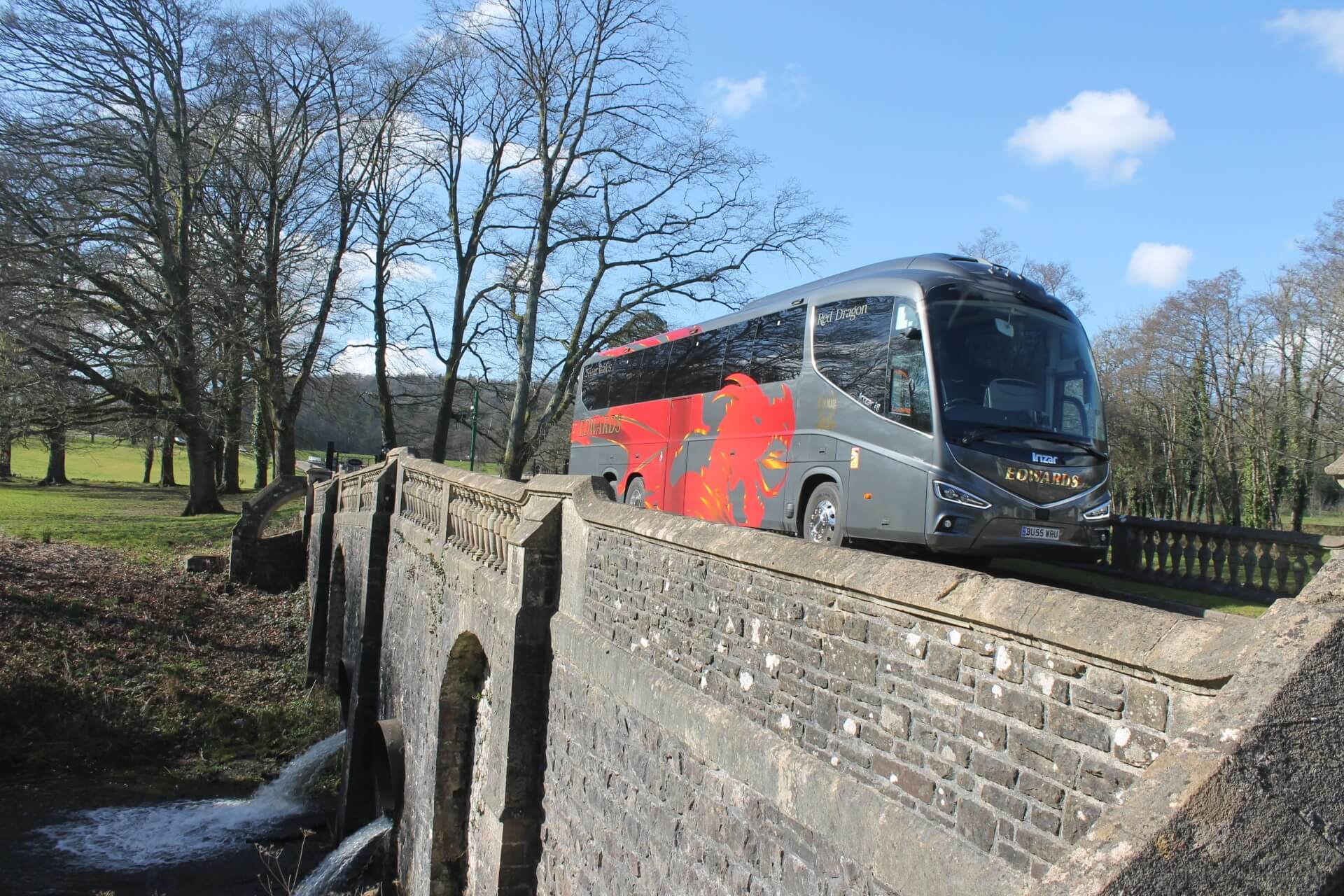
The past and the future of Edwards Coaches
The changing times in coach and bus are well documented in the operator’s newly released publication, Edwards Coaches: A Hundred Years.
Well before the days of fleet management software, GPS and 5G data, Edwards and rivals had to clock in at Bundy clocks positioned along routes to provide punctuality details. Edwards would be fined one shilling per minute for buses running late or early. The post-War years saw the boom in long-distance coaching and Edwards first offered trips to the Continent in the 1960s.
Mike, who began his working career in the coal mine as an apprentice engineer, joined the family business around 1970 when his father, Alvis, persuaded him to cover for an absent fitter. He recalls how, growing up, the family’s Saturday night TV was interrupted as his father took last-minute bookings via the home phone.
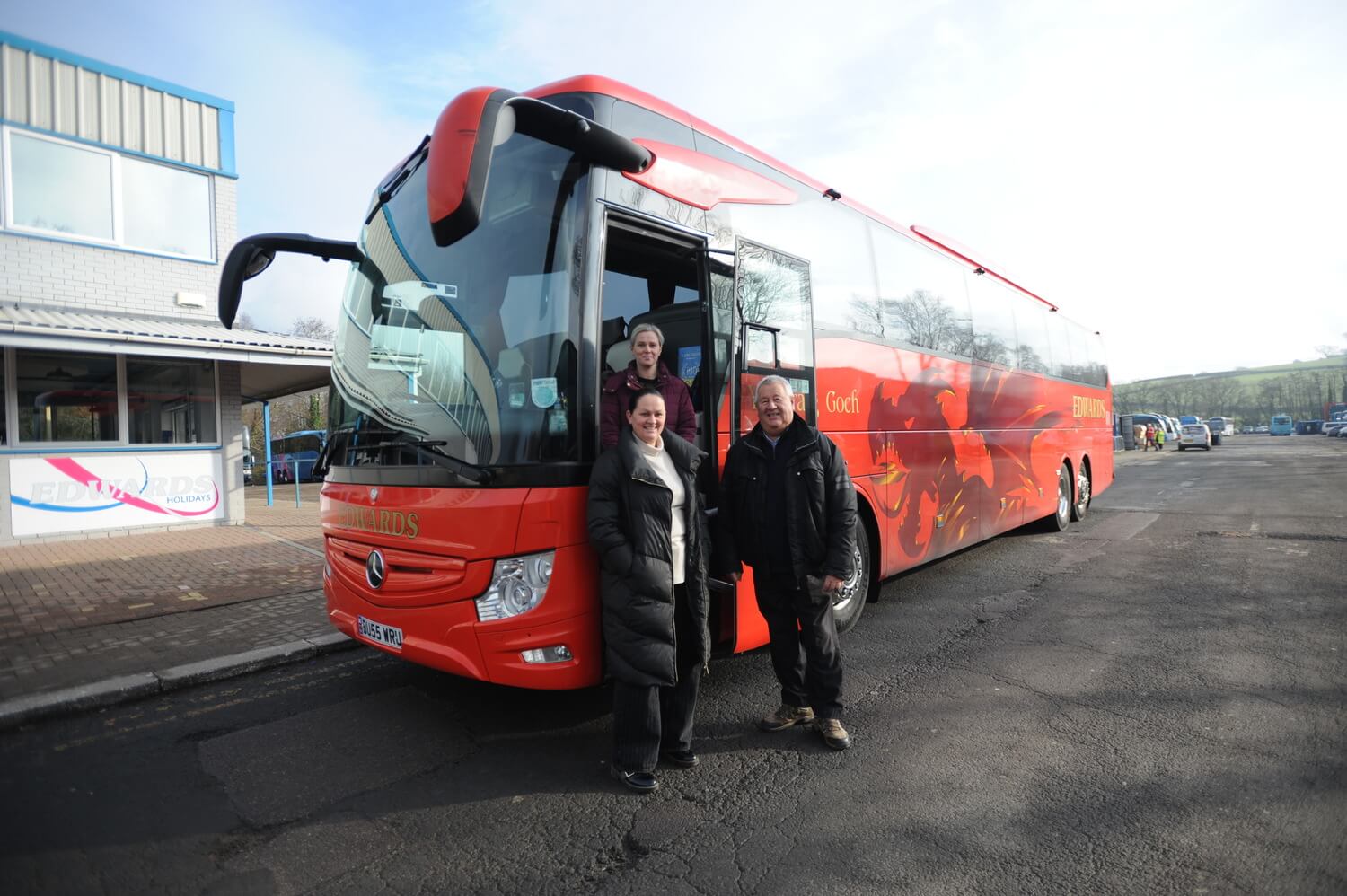
Following Alvis’s heart attack in 1974, the business moved away from total family ownership. Mike eventually bought back full control in 1999.
With the business already having expanded from around 18 vehicles in 1970 to 60 by 2000, Mike has further grown the operation over the quarter of a century since.
In 2016, Edwards bought the current 25-acre site now known as “Parc Busnes Edwards” and moved its National Express and then its other operations there from Llantwit Fardre in 2018.
It enters its centenary year having won the accolade of Large Coach Operator of the Year in the 2024 routeone Awards.
Despite the obvious sense of loyalty to the community, Mike’s business philosophy is clear: “You mustn’t lose track of the fact that we come here every day to make money and to pay the staff good wages — we have many loyal employees with an impressive tenure with us. We’re not running a charity.”
While it may seem Mike was destined to take over the family business, would he have entered the industry if it were not for that connection? He ponders: “I do love the bus industry, but I’m not an anorak!
“I see a row of new coaches coming in, especially National Express — we bought 50 of them in the past year — I haven’t sat in one yet. I don’t want to drive them, but I appreciate the value that our company delivers.
“I’m not a bus enthusiast, but I am an engineer, and I like things to be well-built and solid.” Reminiscing fondly about his time on the tools, Mike adds: “I can rattle off brake-lining and part numbers for a Bedford bus now without even trying.”
Aged 75, he has “cut down”, joking he only works six days a week now, but he is keen to keep busy. He says: “I like coming to work every day, but I’ll know that, in two weeks’ time, I’m going to my apartment in Tenerife, and I’ve paid for that on the strength of me coming to work every day.”
The team of Directors includes his children Jessica Thomas, Kelly Edwards and Shaun Edwards. “You have to learn to delegate and you have to rely on people,” Mike says. “I get involved in everything, but I try not to nudge people out of the way. I let them get on with it, though I’m always available for guidance.”
It is his way of helping to ensure that, after 100 years, the coach operator remains in the family well into a second century.





















